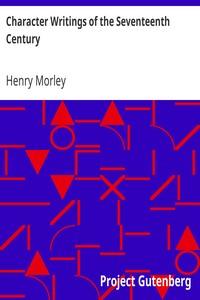|
|
Read this ebook for free! No credit card needed, absolutely nothing to pay.Words: 172694 in 52 pages
This is an ebook sharing website. You can read the uploaded ebooks for free here. No credit cards needed, nothing to pay. If you want to own a digital copy of the ebook, or want to read offline with your favorite ebook-reader, then you can choose to buy and download the ebook.

: The History of England from the First Invasion by the Romans to the Accession of King George the Fifth. Volume 08 of 11. by Belloc Hilaire Lingard John - Great Britain History United Kingdom@FreeBooksTue 06 Jun, 2023 of THE EIGHTH VOLUME. Battle Of Edge Hill--Treaty At Oxford--Solemn Vow And Covenant--Battle Of Newbury--Solemn League And Covenant Between The English And Scottish Parliaments--Cessation Of War In Ireland-Royalist Parliament At Oxford--Propositions Of Peace--Battle Of Marston Moor--The Army Of Essex Capitulates In The West--Self-Denying Ordinance--Synod Of Divines--Directory For Public Worship--Trial Of Archbishop Laud--Bill Of Attainder--His Execution. Treaty proposed and refused. Royalists. Parliamentarians. State of the two armies. The king's protestation. Battle of Edge Hill. Action at Brentford. King retires to Oxford. State of the kingdom. Treaty at Oxford. Intrigues during the treaty. Return of the Queen. Fall of Reading. Waller's plot. Solemn vow and covenant. Death of Hampden. Actions of Sir William Waller. The Lords propose a peace. Are opposed by the Commons. New preparations for war. Battle of Newbury. New great seal. Commissioners sent to Scotland. Solemn league and covenant. Scots prepare for war. Covenant taken in England. Charles seeks aid from Ireland. Federative assembly of the Catholics. Their apologies and remonstrance. Cessation concluded. A French envoy. Royal parliament at Oxford. Propositions of peace. Methods of raising money. Battle of Nantwich. Scottish army enters England. Marches and Countermarches. Rupert sent to relieve York. Battle of Marston Moor. Surrender of Newcastle. Essex marches into the west. His army capitulates. Third Battle of Newbury. Rise of Cromwell. His quarrel with Manchester. First self-denying ordinance. Army new modelled. Second self-denying ordinance. Ecclesiastical concurrences. Persecution of the Catholics. Of the Episcopalians. Synod of divines. Presbyterians and Independents. Demand of toleration. New directory. Trial of Archbishop Land. His defence. Bill of attainder. Consent of the Lords. Execution. Dissensions at court. Proposal of treaty. Negotiation at Uxbridge. Demands of Irish Catholics. Victories of Montrose in Scotland. State of the two parties in England. The army after the new model. Battle of Naseby. Its consequences. Victory of Montrose at Kilsyth. Surrender of Bristol. Defeat of Royalists at Chester. Of Lord Digby at Sherburn. The king retires to Oxford. His intrigues with the Irish. Mission of Glamorgan. Who concludes a secret treaty. It is discovered. Party violence among the parliamentarians. Charles attempts to negotiate with them. He disavows Glamorgan. Who yet concludes a peace in Ireland. King proposes a personal treaty. Montreuil negotiates with the Scots. Ashburnham with the Independents. Charles escapes to the Scots. The royalists retire from the contest. King disputes with Henderson. Motives of his conduct. He again demands a personal conference. Negotiation between the parliament and the Scots. Expedients proposed by the king. Scots deliver him up to the parliament. He still expects aid from Ireland. But is disappointed. Religious disputes. Discontent of the Independents. And of the Presbyterians. The king at Holmby. Character of Fairfax. Opposition of the Independents. Demands of the Army. Refusal of parliament. The army carries off the king. Marches towards London. And treats the king with indulgence. The Independents are driven from parliament. Charles refuses the offers of the army. Which marches to London. Enters the city. And gives the law to the parliament. The king listens to the counsels of the officers. And intrigues against them. Rise of the Levellers. The king's escape. He is secured in the Isle of Wight. Mutiny suppressed. King rejects four bills. Vote of non-addresses. King subjected to farther restraint. Public opinion in his favour. Levellers prevail in the army. The Scots take up arms for the king. Also the English royalists. Feigned reconciliation of the army and the city. Insurrection in Kent. Presbyterians again superior in parliament. Defeat of the Scots. And of the earl of Holland. Surrender of Colchester. Prince of Wales in the Downs. Treaty of Newport. Plan of new constitution. Hints of bringing the king to trial. Petition for that purpose. King's answer to the parliament. His parting address to the commissioners. He is carried away by the army. Commons vote the agreement with the king. The House of Commons is purified. Cromwell returns from Scotland. Independents prevail. Resolution to proceed against the king. Appointment of the High Court of Justice. Hypocrisy of Cromwell. Conduct of Fairfax. King removed from Hurst Castle. Few powers interest themselves in his favour. Proceedings at the trial. Behaviour of the king. He proposes a private conference. Is condemned. Lady Fairfax. King prepares for death. Letter from the prince. The king is beheaded. THE COMMONWEALTH. Establishment Of The Commonwealth--Punishment Of The Royalists--Mutiny And Suppression Of The Levellers--Charles Ii Proclaimed In Scotland--Ascendancy Of His Adherents In Ireland--Their Defeat At Rathmines--Success Of Cromwell In Ireland--Defeat Of Montrose, And Landing Of Charles In Scotland-Cromwell Is Sent Against Him--He Gains A Victory At Dunbar--The King Marches Into England--Loses The Battle Of Worcester--His Subsequent Adventures And Escape. Abolition of the monarchy. Appointment of a council of state. Other changes. Attempt to fill up the house. Execution of the royalists. Opposition of the Levellers. Their demands. Resisted by the government. The mutineers suppressed. Proceedings in Scotland. Charles II proclaimed in Edinburgh. Answer of the Scots. Their deputies to the king. Murder of Dr. Dorislaus. State of Ireland. Conduct of the nuncio. His flight from Ireland. Articles of peace. Cromwell appointed to the command. Treaty with O'Neil. Cromwell departs for Ireland. Jones gains the victory at Rathmines. Cromwell lands. Massacre at Drogheda. Massacre at Wexford. Cromwell's further progress. Proceedings in Scotland. Charles hesitates to accept the conditions offered by the commissioners. Progress and defeat of Montrose. His condemnation. His death. Charles lands in Scotland. Cromwell is appointed to command in Scotland. He marches to Edinburgh. Proceedings of the Scottish kirk. Expiatory declaration required from Charles. He refuses and then assents. Battle of Dunbar. Progress of Cromwell. The king escapes and is afterwards taken. The godliness of Cromwell. Dissensions among the Scots. Coronation of Charles. Cromwell lands in Fife. Charles marches into England. Defeat of the earl of Derby. Battle of Worcester. Defeat of the royalists. The king escapes. Loss of the royalists. Adventures of the king at Whiteladies. At Madeley. In the royal oak. At Moseley. At Mrs. Norton's. His repeated disappointments. Charles escapes to France. Vigilance Of The Government--Subjugation Of Ireland--Of Scotland--Negotiation With Portugal--With Spain--With The United Provinces--Naval War--Ambition Of Cromwell--Expulsion Of Parliament--Character Of Its Leading Members--Some Of Its Enactments. The Commonwealth, a military government. Opposition of Lilburne. His trial and acquittal. And banishment. Plans of the royalists. Discovered and prevented. Execution of Love. Transactions in Ireland. Discontent caused by the king's declaration in Scotland. Departure of Ormond. Refusal to treat with the parliament. Offer from the duke of Lorraine. Treaty with that prince. It is rejected. Siege of Limerick. Submission of the Irish. State of Ireland. Trials before the High Court of Justice. Transportation of the natives. First act of settlement. Second act of settlement. Transplantation. Breach of articles. Religious persecution. Subjugation of Scotland. Attempt to incorporate it with England. Transactions with Portugal. With Spain. With United Provinces. Negotiations at the Hague. Transferred to London. Recontre between Blake and Van Tromp. The States deprecate a rupture. Commencement of hostilities. Success of De Ruyter. Of Van Tromp over Blake. Another battle between them. Blake's victory. Cromwell's ambition. Discontent of the military. Cromwell's intrigues. His conference with Whitelock. With the other leaders. He expels the parliament. And the council of state. Addresses of congratulation. Other proceedings of the late parliament. Spiritual offences. Reformation of law. Forfeitures and sequestrations. Religious intolerance. THE PROTECTORATE. Cromwell Calls The Little Parliament--Dissolves It--Makes Himself Protector--Subjugation Of The Scottish Royalists--Peace With The Dutch--New Parliament--Its Dissolution--Insurrection In England--Breach With Spain--Troubles In Piedmont--Treaty With France. Free books android app tbrJar TBR JAR Read Free books online gutenberg More posts by @FreeBooks
: Character Writings of the Seventeenth Century by Morley Henry Editor - English literature; Characters and characteristics in literature@FreeBooksTue 06 Jun, 2023

: The Aeroplane Boys on the Wing; Or Aeroplane Chums in the Tropics by Langworthy John Luther - Aeronautics Juvenile fiction@FreeBooksTue 06 Jun, 2023
|
Terms of Use Stock Market News! © gutenberg.org.in2025 All Rights reserved.






